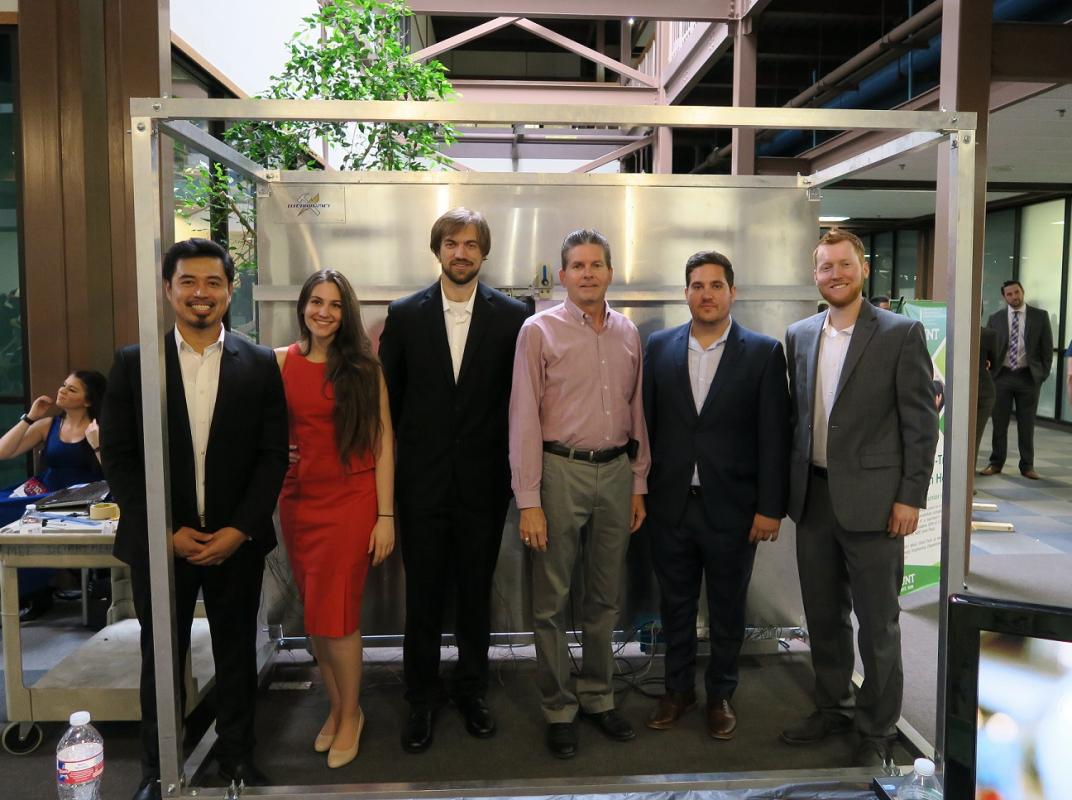
Students who learn to apply theoretical concepts to practical applications are more likely to succeed in the real world than those who don’t gain the hands-on experience. That’s why in the College of Engineering all undergraduate seniors are required to complete a senior design capstone, known as The Engineer’s Aerie.
The capstone program teaches students about project planning, budgeting, scheduling, analysis, design, fabrication and testing. It also enables students to develop their communication skills through a visual and oral presentation before an audience of peers, faculty, and experts in industry at Design Day, held on the last Friday of April each year.
Last year, 80 percent of the senior design projects in the Department of Mechanical and Energy Engineering were sponsored by industry. This year, 100 percent of capstone projects were sponsored.
“As their capstone experience, our students yearn for real life projects to apply what they have learned. They spend so much time together their senior year in teams designing and building their own ideas. Many develop lifelong friends. Nothing teaches engineering like a customer with a real project need, and nothing provides a better education than matching students with projects they are passionate about,” said Mark Wasikowski, mechanical and energy engineering clinical associate professor, senior design coordinator and undergraduate advisor. “Personally, it has been a joy to help the students and watch them mature in their engineering career.”
Within his department, Wasikowski says the department is able to provide opportunities for students in a variety of mechanical engineering fields, ranging from machine design, robotics and combustion science to manufacturing automation, HVAC, energy sustainability, aerospace and transportation. The students also get to work with organizations like Lockheed Martin, ASME, GE Transportation NASA and CCC Power, among others.
One group of students – Sarah Bundy, Brandon Leney, Ryne Spears, Preston Stalter, Blake Stewart and Phai Thach – selected a project sponsored by the Triumph Group. For the project, the students were asked to explore ways to improve their drilling and riveting process.
“One of the best options found was an automated drilling system run on a track that could be temporarily fixed on the panels, so we decided to verify the viability of this option by creating our own simplified version of this robotic drilling system and track,” said Bundy, who focused on the project’s mechanical design.
Stewart, who created the code that tells the robot how to operate, said it was programmed to drill a set pattern of holes on a loop to demonstrate the robot’s repeatability. A program also was written to etch letters into the metal so as to showcase the robot’s accuracy.
In addition to the practical experience gained from working on the project itself, students also are given the chance to network with industry engineers and, for some, are exposed to additional company tours and other opportunities the sponsoring organization offers.
“Working with Triumph was amazing; our sponsor Don Surratt was incredibly helpful,” said Stewart. “Don always made himself available to us for multiple hours every week. He also set up numerous factory tours to help the team better understand the project requirements.”
Bundy agrees.
“Being on a sponsored project is excellent,” she said. “I highly recommend to any students choosing a project to go for the sponsored ones. There’s a lot to be learned from people who have been working industry for a long time.”
But the benefits aren’t one-sided. In fact, in today’s economy, companies are struggling with an aging workforce and are short-staffed in key technical areas, making it difficult for them to solve new and challenging engineering problems.
For Triumph and other sponsoring organizations, The Engineer’s Aerie helps the company find a solution to one of their long-standing projects by allowing students to tackle it under faculty and industry mentorship, freeing up company resources to focus on other strategic, high-value projects. The capstone process also provides sponsoring organizations an opportunity to evaluate and recruit students as openings arise.
“Working with the students was great,” said Don Surratt, Triumph Group. “They had tremendous enthusiasm and excitement toward the project and it provided me an opportunity to mentor them on aircraft hole drilling processes and methods. They each had an opportunity to actually drill test plates and install rivets in our training classroom. As a 1987 UNT alumnus, it also provided me an opportunity to give back to the college and maybe spark some student interest in the career of aerospace and manufacturing with Triumph.”
To learn more about sponsoring a capstone project, contact Thomas Derryberry, assistant dean for corporate relations, at tom.derryberry@unt.edu.
